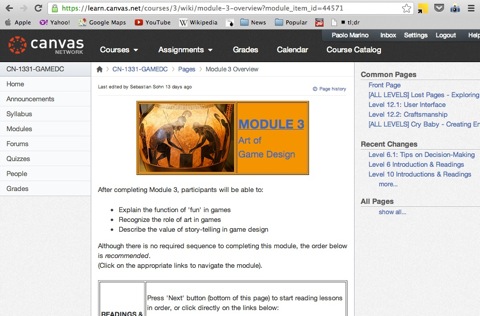
My next foray in online education (and - alas - my first failure) was Game Design Concepts (wayback machine capture). This one is provided by Canvas Network, a new entry among the MMO providers and - to my delight - talks of games in general, and for the most part it means "board games" and not, as you might expect, about computer games.

you have to buy a specific text. It is apparently mandatory - on the other hand you were supposed to buy a book for the AI course, too - but in the end I skimmed a couple chapters but for the most part I really didn't feel as if I needed it to go on.
I abandoned it at around 50% (more on this later) so I may be wrong, but in this case I do believe that the book is really required to get a good score during the tests.
Apart from that, the other two things that really set this course apart are the lack of video or audio lessons, and the pretty hands-on approach (especially surprising for an online course).
So far all the other courses had either proper video, or at least a voiceover of the teacher commenting the slides. In this case (apart from some short animated videos) you mostly have to read stuff online and offline. Most units start with a list of articles you should read, and what chapters from the books are required.
And then there are the games themselves…
The course is built so that you do a lot of practical gaming and game design, straight from the start. There are lists of games you should play (most of these are provided in some form that allows you to play against the computer or online) - appropriately selected to stress points about the current unit. And then you are encouraged to design games, either variations to existing games (like changing one rule from Monopoly and trying to understand the effects) or simpler but complete games.
And all this is in preparation of the final assignment, which is creating a full prototype for a complete game (you can tackle this at three level of complexity, i.e. you can make a design according to progressively more complex constraints, like making a game about WWI without combat mechanics).
The game idea and (I suppose) its implementation will be then crowd-graded by your fellow students.
And here is why I abandoned the course in the end, despite considering games and game mechanics something I like a lot.
Well, the point is that apparently I like theme in an abstract way, like algorithms, but I am apparently not so keen on actually playing - and in order to design you have to play test a lot.
And interact a lot on the course forum. This is something you are encouraged to do in all the courses, to help your fellow students, to get help, and to catch any problems in the course materials.
But in this case it was really too much. Surprisingly enough even if I had a good grasp of many of the topics the level of commitment required for this course made me impossible to go forward at least this time (I am tackling another course at the same time, and that no walk in the park, either).
I am still happy to have followed at least part of it, because it explained things like the MDA paradigm which was news to me (and I suppose may come handy in my work, too, sooner or later). And I still have the book, either to read on my own or in case I manage to try again at a later date.
On a more personal level, I must add that I learned more about what I like about games, and why I do like them even if at the end of the day I don't spend a lot of time playing (either on a computer or with "non digital" games).
A bit of an epiphany, even.